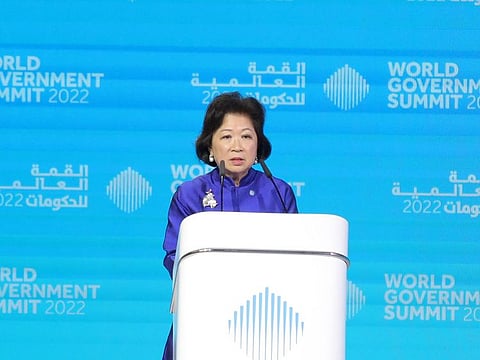WGS 2022: Governments need to retain COVID-19 phase transparency to take on new challenges
Tackling COVID-19 brought on new levels of transparency in how governments function

Dubai: New vulnerabilities cutting across multiple fronts could further exacerbate the impact on the global economy, according to a top World Bank official. To tackle these challenges, the need is for a fundamental shift in managing risks.
“We gather at a time when the world faces multiple inter-linked crises - from COVID-19 to climate change to conflict,” said Mari Pangestu, Director-General for Development Policy and Partnerships at the Washington D.C. based World Bank. “The devastation caused by the attack on Ukraine is likely to erode significant near term global economic prospects.”
Pangestu urged countries to take a ‘citizen-based approach’ where governments must keep up with the challenges and changes. “Governments and institutions must be fit-for-purpose and fit-for-the-future to better prevent, prepare and respond to shocks, as well as the challenges ahead.”
She said the time is ripe for a change in governance and institutions to better enable individuals to tackle complex global challenges that can only be resolved through collective action.
Enhance public trust
According to the World Bank data, levels of integrity, fairness and openness in institutions are strong predictors of people’s trust in governments. Pangestu said that the government’s responsiveness and reliability in delivering public services and anticipating new needs are crucial for boosting trust in institutions. “Rebuilding social contracts will require governments to increase efficiency, transparency and accountability as well as to manage corruption,” said Pangestu. “On the point of openness, leadership and clear communication to the public during the pandemic served as important lessons learned in building public trust.”
Greater use of technology
The pandemic accelerated digitization and showed how data and technology can contribute to better governance to inform decisions taken by governments to monitor the implementation and impact of decisions taken. It also underscored the need to address the digital divide, so that citizens who lack digital access and skills are not left behind. Around 2.9 billion people still remain offline, and 40 per cent of the developing world are not using the internet.
Pangestu said: “Governments can play - and should play - an important role in fostering private sector participation in the public sector, and harnessing the innovations of tech companies while providing a trusted digital ecosystem and protecting users.”
Risk Identification
Pangestu urges governments to build out their capability of long-range risk forecasting and to improve their capacity to deal with future crises and challenges. “Critical decisions need to be made swiftly as crisis impacts may spread beyond national borders, and trigger significant economic, social and environmental effects.”
Governments have a significant role to play in strengthening the resilience of their populations, communities, and critical infrastructure, networks and systems. “This ranges from strengthening health and surveillance systems, macro-financial systems and adaptation protecting natural resources and disaster risk management on climate return related risk,” the World Bank official added.
Sign up for the Daily Briefing
Get the latest news and updates straight to your inbox


